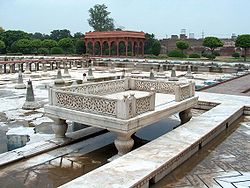Shalimar Tehsil
(Redirected from Shalimar, Pakistan)
Shalimar
تحصیل شالیمار | |
|---|---|
| Country | Pakistan |
| Province | Punjab |
| City District | Lahore |
| Union Councils | 18 |
| Government | |
| • Type | Tehsil Municipal Administration |
| Population | |
| • Total | 2,280,308 |

Shalimar (Punjabi, Urdu: شالیمار) is an administrative town (tehsil) in Lahore, Punjab, Pakistan.[2] It forms one of the 10 municipalities of Lahore City District.[3]
History[edit]
Shalimar is one of the oldest neighbourhoods in Lahore, located along the historic Grand Trunk Road. Settlement of this area dates back to the 15th century during the Mughul Empire. The town is named after the Shalimar Gardens, built by Emperor Shah Jehan in 1640.[4] The Mela Chiraghan festival used to take place at Shalimar Gardens, until President Ayub Khan ordered against it in 1958. Shalimar was officially declared a township in 1962 and became an administrative town (tehsil) of Lahore City District in 2001.
Neighbourhoods[edit]
- Bhaghatpura (UC 15)
- Gujjarpura (UC 16)
- Rehmatpura (UC 17)
- Begampura (UC 18)
- Chah Miran (UC 19)
- Bilal Bagh (UC 20)
- Makhanpura (UC 21)
- Kot Khawaja Saeed (UC 22)
- Shad Bagh (UC 23)
- Wassanpura (UC 24)
- Faiz Bagh (UC 25)
- Farooqganj (UC 26)
- Crown Park (UC 33)
- Madhu Lal Hussain (UC 34)
- Muhammad Din Colony(UC 35)
- Baghbanpura (UC 36)
- Angori Bagh (UC 46)
- Ramgarh (UC 47)
Academic Institutions[edit]
Healthcare[edit]
See also[edit]
References[edit]
- ^ "DISTRICT AND TEHSIL LEVEL POPULATION SUMMARY WITH REGION BREAKUP: PUNJAB" (PDF). Pakistan Bureau of Statistics. 2018-01-03. Retrieved 2018-04-30.
- ^ "Convenience stalls - TNS - The News on Sunday". tns.thenews.com.pk.
- ^ "TMA Lahore Division - Local Government and Community Development". lgcd.punjab.gov.pk.
- ^ REHMAN, ABDUL (24 February 2018). "CHANGING CONCEPTS OF GARDEN DESIGN IN LAHORE FROM MUGHAL TO CONTEMPORARY TIMES". Garden History. 37 (2): 205–217. JSTOR 27821596.

